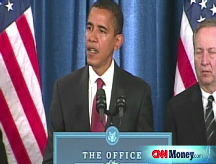Obama seeks Volcker's help
Former Fed chief to head special advisory board of Washington outsiders to help with financial crisis. President-elect tells Americans 'help is on the way.'
NEW YORK (CNNMoney.com) -- President-elect Barack Obama on Wednesday named former Federal Reserve Chairman Paul Volcker as the head of a special economic recovery advisory board.
Volcker, 81, is credited with taming inflation in the 1980s, and in the process making the difficult and unpopular choice of causing a recession in the short-term in order to pave the way for a long-term recovery.
Volcker "has been by my side throughout this campaign, providing a deep understanding of financial markets, extensive experience managing economic crises, and keen insight into the global nature of this particular crisis," Obama said during a press conference, his third for the week. "He pulls no punches."
The group Volcker will chair will include 8 to 16 members who will provide the new administration with advice on dealing with the nation's financial crisis. It will exist for two years and will meet roughly once a month.
The members will be Washington outsiders who hail from business, labor, academia and other arenas to provide first-hand understanding of how economic policies are working on the ground, Obama said.
"Sometimes policy-making ... can become ... a little bit too insular. ... You start engaging in group-think. And those who serve in Washington don't always have a ground-level sense of which programs and policies are working for people and businesses and which aren't," Obama said.
To Americans frustrated with the economy and their own financial prospects, Obama said, "[they] should understand help is on the way." Neither he nor his transition team is saying yet in anything other than general terms what kind of help will be coming.
But Obama reiterated that his administration would put into effect "a strong stimulus, an economic recovery plan that is designed to put people back to work. ... It is going to be large enough to jumpstart the economy."
He has called for lawmakers to come up with a package that invests in infrastructure, green energy and tax cuts for the middle class. Some have estimated the price tag could run between $500 billion and $700 billion.
Obama said Treasury's and the Fed's latest effort to ease the credit crisis - committing $200 billion to spur more consumer and small business lending and another $600 billion to buy the debt of mortgage giants Fannie Mae and Freddie Mac - was a "positive sign."
"We have to do whatever is required in order to make sure that our financial system stays effective in being able to get credit to the markets. And it is important for us to make sure that the federal government ... use [its authority] in a forceful fashion," he replied to a question from CNN's Ed Henry.
Volcker presided over the Federal Reserve from 1979 to 1987 in the Carter and Reagan administrations. He is best known for taking raging inflation during that time by the scruff of the neck and breaking it by raising interest rates to historic highs.
The initial effect of that move created a recession and high unemployment rate. But it also laid the groundwork for a long bull market.
Volcker also served in a variety of positions with the Treasury during the Kennedy, Johnson and Nixon administrations, and was president of the New York Federal Reserve from 1975 to 1979.
His private-sector experience includes the chairmanship of an investment banking firm and a stint as vice president at Chase Manhattan Bank. He also chaired the investigation into the United Nations Oil for Food Program.
Obama on Wednesday also appointed University of Chicago economics professor Austan Goolsbee to serve as the economic recovery board's staff director and chief economist. And he nominated Goolsbee to sit on the administration's Council of Economic Advisers.
Goolsbee, 39, "is one of America's most promising economic minds, known for his path-breaking work on tax policy and industrial organization. He is one of the economic thinkers that has most shaped my own thinking on economic matters," Obama said.
Obama promised he would raise income tax rates on high-income taxpayers to their 2001 levels to help pay for new programs and to restore more fairness to the tax code, although he has left open the possiblity that he may postpone doing so until the economy is on firmer footing.
Goolsbee has pointed to research that income for the top 1% of earners rose disproportionately relative to everyone else, both when tax rates fell and when they rose.
"Seeing the same pattern ... indicates that tax cuts weren't responsible. It suggests that cuts for high-income taxpayers likely gave windfalls to those whose incomes were already rising sharply because of broader market forces," he wrote in a New York Times column.
Goolsbee, in addition to serving as top economic adviser to Obama during the campaign, is a member of the Congressional Budget Office's economic advisory panel and a research associate at the National Bureau of Economic Research.
On Tuesday, Obama nominated Peter Orszag to head the Office of Management and Budget (OMB), the president's chief number-crunching department.
Obama nominated New York Federal Reserve President Timothy Geithner to be Treasury Secretary on Monday. And he tapped former Harvard President Lawrence Summers as the director of the National Economic Council.
The appointments came as Obama prepared to take office amid the worst economic crisis since the Great Depression. Obama will be sworn in Jan. 20.
"I've sought leaders who could offer both sound judgment and fresh thinking, both a depth of experience and a wealth of bold, new ideas, and most of all who share my fundamental belief that we cannot have a thriving Wall Street without a thriving Main Street," Obama said at a press conference Monday in Chicago.
-- CNN's Suzanne Malveaux and Allan Chernoff and CNNMoney.com's Ben Rooney contributed to this report. ![]()


